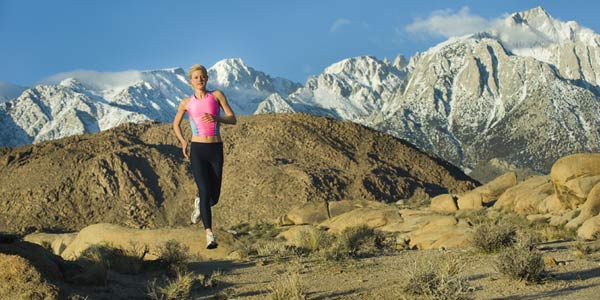Why Do Athletes Train at High Altitudes?

To prepare for last month's World Cup, the American and English squads took two different paths toward acclimating to South Africa's higher altitude. The English players spent two weeks training in the Austrian Alps, but the Americans chose to not sacrifice the practice time needed to adjust their bodies to the elevation of the tournament.
Because both teams lost and were sent home at the same point in the tournament, it's hard to say which approach was better. But now, new research from Oxford University suggests that an approach somewhere in the middle may be best.
Why altitude training works
Athletes from many sports have used altitude training to prepare for a big match or event, and not just when the event will be at a high altitude. They do this because the air is "thinner" at high altitudes meaning there are fewer oxygen molecules per volume of air. Every breath taken at a high altitude delivers less of what working muscles require.
While the effect is most dramatic at altitudes greater than 8,000 feet (2,438 meters) above sea level, it is noticeable even at 5,000 feet (1,524 meters) above sea level.
To compensate for the decrease in oxygen, one of the body's hormones, erythropoietin (EPO), triggers the production of more red blood cells to aid in oxygen delivery to the muscles.
You might have heard of EPO in news stories about performance-enhancing drugs. A synthetic version of EPO has been used by endurance athletes to mimic the body's natural process of red blood cell creation. So far, most sports organizations are more concerned with this artificial version rather than triggering it naturally up in the mountains.
Sign up for the Live Science daily newsletter now
Get the world’s most fascinating discoveries delivered straight to your inbox.
By training at high altitudes, athletes aim to allow their bodies to produce extra red blood cells. Then, they head to a competition at lower elevations to take advantage of their changed physiology, which should last for 10 to 20 days.
While the benefits of altitude training have been demonstrated, specifics on how to best undertake it have remained elusive.
New findings
"It is the higher capacity to deliver fuel to muscles that athletes are interested in," said Dr. Federico Formenti, a physiology researcher at the University of Oxford and lead author of the new study. "However, it's not clear how long they should train at altitude or how high up they need to be to get the optimal benefits."
Formenti's team studied the effects of altitude training in patients with a rare genetic disorder, called Chuvash polycythemia or CP, and a group of equally fit people without CP. In people without the disorder, the body's reaction to high altitudes starts with a protein called hypoxia-inducible factor (HIF), which triggers a series of physiological changes. But in those with the disorder, a person's level of HIF remains elevated even when they are at sea level. This condition offered the researchers an opportunity to study the metabolic effects of permanently being in the "high-altitude" state.
The researchers asked volunteers to pedal a bike at a constant rate while the resistance was slowly increased. The results showed those with CP had to quit the test early and achieved a work rate that was 70 percent that of those without CP.
"We found that the metabolism of CP patients is different and leads to poorer physical performance and endurance," Formenti said. "Although this is a small study necessarily so because of there are so few people with the condition the results are striking. The differences seen in those with Chuvash polycythemia were large, and five patients were more than enough to see this effect."
Because the people with CP did more poorly than those without it, the researchers concluded that there are limits to the benefits of training at high altitudes, which also increases levels of HIF in the body.
So, optimizing the altitude training formula of how high to go and how long to stay there could be the difference between raising the Cup or going home early.
The research was published in the journal Proceedings of the National Academy of Sciences and was funded by the British Heart Foundation and the Wellcome Trust.
- How Does Caffeine Help Athletes?
- How Do Athletes Get â??In the Zoneâ?? of Peak Performance?
- Does Human Growth Hormone Really Help Athletes?
Dan Peterson writes about sports science at Sports Are 80 Percent Mental.









